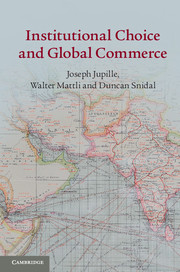1 - Introduction
Institutional choice and global commerce
Published online by Cambridge University Press: 05 June 2014
Summary
In the nineteenth century, Egypt experienced the most remarkable explosion of commercial activity anywhere in the Mediterranean. The underlying causes of this development were multiple: a new political elite with a strong modernizing and liberalizing agenda; the advent of revolutionary communications and transportation technologies; and the opening of the Suez Canal, which enormously facilitated commerce between East and West. The transformations brought about by these factors were profound. Alexandria, for example, a quiet trading town in the early nineteenth century with a population of some 40,000 and a foreign merchant community of a few hundred, by 1873 became a bustling cosmopolitan city of 280,000 inhabitants and one of the world's leading commercial hubs.
As early as the middle of the century, merchants had begun to call for a system of global trade dispute resolution. In 1876, after a period of highly protracted international negotiations among leading trading nations, the “Mixed Courts” of Egypt – the world's first international tribunals for commercial dispute resolution – opened their doors in Alexandria and Cairo. Astonishingly, the Mixed Courts went from strength to strength despite an exceptionally challenging geo-political context: British occupation of Egypt in 1882, the Fashoda incident of 1898, and the First World War. By the fiftieth anniversary of the Mixed Courts, the number of foreign and Egyptian judges had grown from the original twenty-five to seventy, supported by a staff of about 14,000 hailing from more than a dozen countries. Nearly 24,000 cases were decided annually by the mid 1920s. The Courts persisted through the Great Depression, eventually closing their doors in 1949. Memory of these extraordinary institutions quickly faded. Today, the Mixed Courts are largely forgotten.
Information
- Type
- Chapter
- Information
- Institutional Choice and Global Commerce , pp. 3 - 18Publisher: Cambridge University PressPrint publication year: 2013
